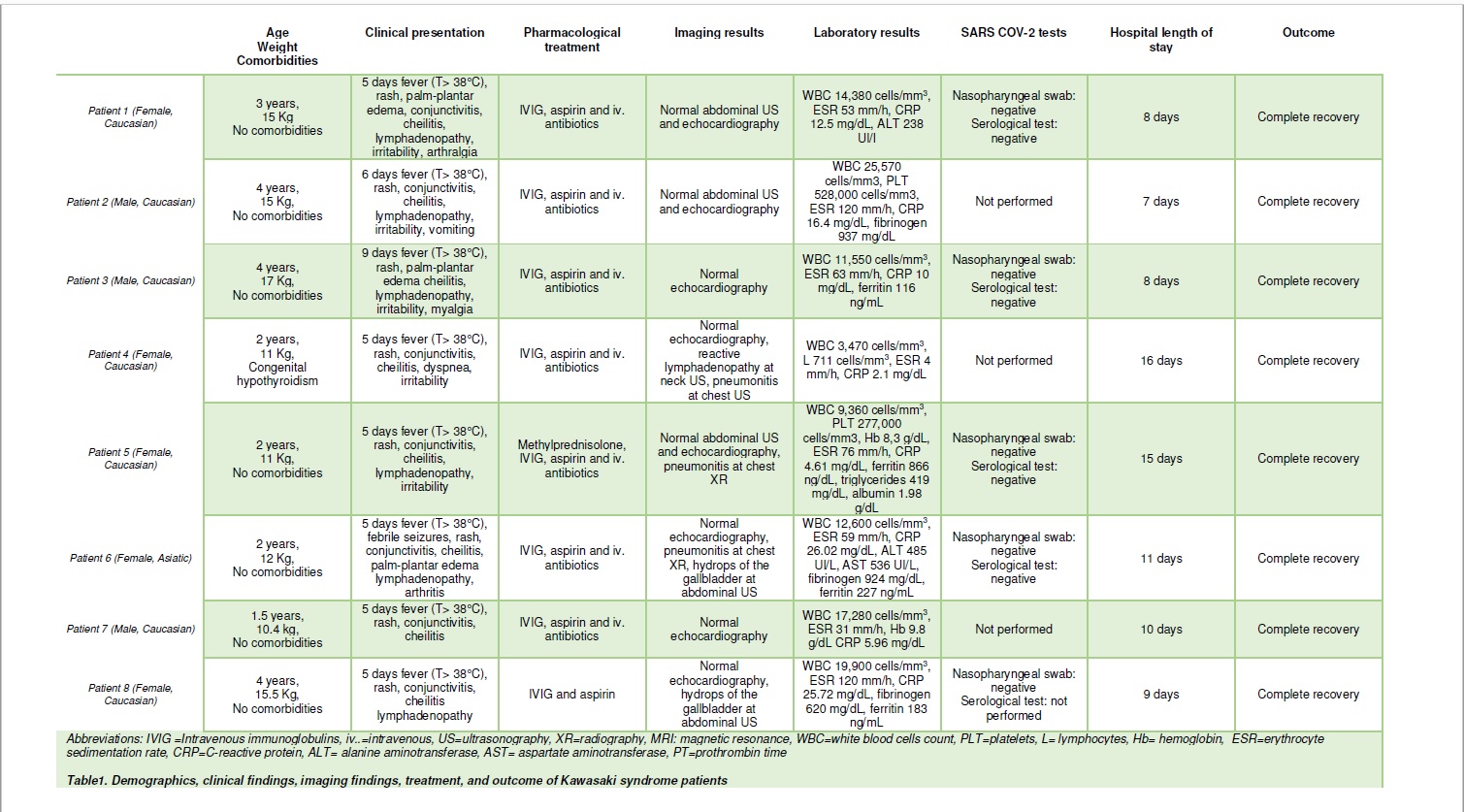Session Information
Date: Monday, November 9, 2020
Title: Pediatric Rheumatology – Clinical Poster III: SLE, Vasculitis, & JDM
Session Type: Poster Session D
Session Time: 9:00AM-11:00AM
Background/Purpose: At the end of April 2020, national and international Pediatrics scientific societies diffused an alert about a rise in the number of pediatric severe, inflammatory syndrome, coronavirus 2 (SARS-CoV-2) related, resembling Kawasaki disease (KD).
Methods: The Pediatric Rheumatology Tuscany Network worked out the COV-ASAKI survey to track children who received a KD diagnosis in during COVID-19 pandemic in a region hosting 593.606 people aged less than 18 years. We retrospectively collected demographics, clinical and imaging findings, treatment and outcome of KD children between February 1st to April 30th, 2020 and compared the number of cases in the 2020 index trimester with the same trimesters of the previous 5 years and overall with the total number in the last 5 years.
Results: 8 children were diagnosed as KD, with an incidence rate of 2.6/ month. 1 child presented an incomplete KD. 7 were Caucasian and 1 Asiatic, without any underlying disease. 6 recovered after one course of intravenous immunoglobulins (IVIG), no specific intensive support was required. 1 patient needed two IVIG courses, a young girl developed an incipient macrophage activation syndrome (MAS) responsive to a single steroid pulse. The SARS-CoV-2 on nasopharyngeal swab, available in 6/8 children, was negative. 4 KD children, sampled for antibodies after recovery, resulted negative. No coronary involvement was reported. From February 1st and April 30th, 1992 nasopharyngeal swabs have been performed to the Tuscan children admitted to the hospitals: 85/1992 (4.3%) resulted positive for SARS CoV-2. 50 serological tests have been performed with 7 positive results. Considering the previous 5 years, 165 children were diagnosed with KD (incidence 2.7 per month). 59 were incomplete forms; 3 developed MAS and 1 experienced Kawasaki disease shock syndrome (KDSS). 38 showed coronary involvement , 11 received steroid pulses and additional 3 biologic therapy. No statistically significant difference in the incidence/month was found (RR 1.09, 95% CI 0.52-2.04, p=0.76), neither limiting the analysis to the 45 KD children diagnosed during the same corresponding 3-months of the last 5 years: 3 vs 2.6 (RR 1, 95% CI 0.46-1.98, p=0.96). Chi square analysis with Fisher’s exact test correction failed to detect significant differences among the principal outcomes of KD children observed during the COVID-19 time and in the last 5 years: incomplete KD 59 vs 1, c2=1.82; KDSS 1 vs 0, c2=0.04; MAS: 3 vs 1, c2=3.85; coronary involvement 38 vs 0, c2=2.36. The same results have been detected adjusting the analysis for the 45 cases during the corresponding trimesters of the last 5 years (p=n.s, Fisher’s exact test).
Conclusion: In Tuscany, during the COVID-19 pandemic, almost all KD patients, showed a mild disease course and completely recovered without complications. The long-lasting collaboration and the well-structured communication of our pediatric network provided a prompt intervention in new KD cases during COVID-19 pandemic and allowed a comparison between 2020 KD cluster and the previous ones, A comparison between our data and the results seen worldwide will be helpful to define the multifaceted nature of the pediatric COVID-19 and its potential relationship with the KD.
To cite this abstract in AMA style:
Mastrolia M, Agostiniani R, Azzari C, Bernardini R, Bottone U, Calabri G, Civitelli F, Consolini R, Danieli R, Di Silvio R, Falorni S, Gagliardi L, Grosso S, Martini M, Memmini G, Pezzati M, Suriano G, Tafi L, Vaccaro A, Vasarri P, Simonini G. The COV-ASAKI Survey from the Pediatric Tuscany Network During COVID-19 Era [abstract]. Arthritis Rheumatol. 2020; 72 (suppl 10). https://acrabstracts.org/abstract/the-cov-asaki-survey-from-the-pediatric-tuscany-network-during-covid-19-era/. Accessed .« Back to ACR Convergence 2020
ACR Meeting Abstracts - https://acrabstracts.org/abstract/the-cov-asaki-survey-from-the-pediatric-tuscany-network-during-covid-19-era/

